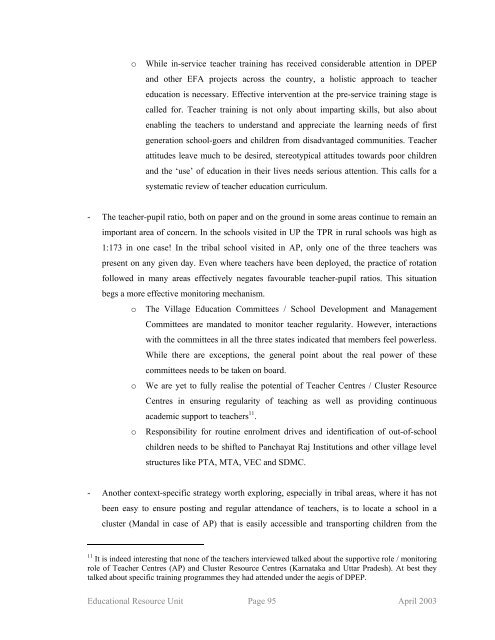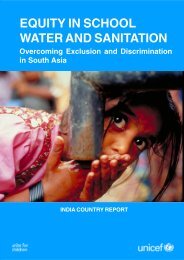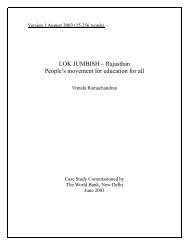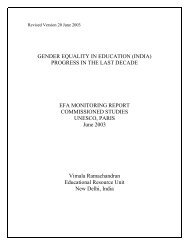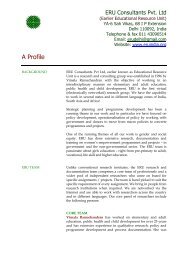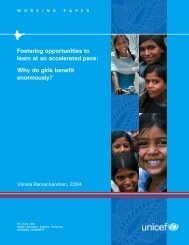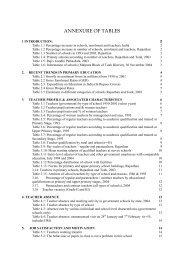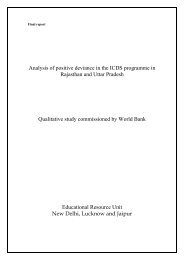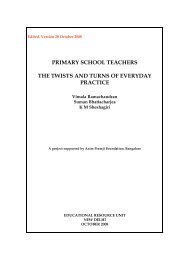Snakes and Ladders - ERU Consultants Pvt. Ltd.
Snakes and Ladders - ERU Consultants Pvt. Ltd.
Snakes and Ladders - ERU Consultants Pvt. Ltd.
Create successful ePaper yourself
Turn your PDF publications into a flip-book with our unique Google optimized e-Paper software.
o While in-service teacher training has received considerable attention in DPEP<br />
<strong>and</strong> other EFA projects across the country, a holistic approach to teacher<br />
education is necessary. Effective intervention at the pre-service training stage is<br />
called for. Teacher training is not only about imparting skills, but also about<br />
enabling the teachers to underst<strong>and</strong> <strong>and</strong> appreciate the learning needs of first<br />
generation school-goers <strong>and</strong> children from disadvantaged communities. Teacher<br />
attitudes leave much to be desired, stereotypical attitudes towards poor children<br />
<strong>and</strong> the ‘use’ of education in their lives needs serious attention. This calls for a<br />
systematic review of teacher education curriculum.<br />
- The teacher-pupil ratio, both on paper <strong>and</strong> on the ground in some areas continue to remain an<br />
important area of concern. In the schools visited in UP the TPR in rural schools was high as<br />
1:173 in one case! In the tribal school visited in AP, only one of the three teachers was<br />
present on any given day. Even where teachers have been deployed, the practice of rotation<br />
followed in many areas effectively negates favourable teacher-pupil ratios. This situation<br />
begs a more effective monitoring mechanism.<br />
o The Village Education Committees / School Development <strong>and</strong> Management<br />
Committees are m<strong>and</strong>ated to monitor teacher regularity. However, interactions<br />
with the committees in all the three states indicated that members feel powerless.<br />
While there are exceptions, the general point about the real power of these<br />
committees needs to be taken on board.<br />
o We are yet to fully realise the potential of Teacher Centres / Cluster Resource<br />
Centres in ensuring regularity of teaching as well as providing continuous<br />
academic support to teachers 11 .<br />
o Responsibility for routine enrolment drives <strong>and</strong> identification of out-of-school<br />
children needs to be shifted to Panchayat Raj Institutions <strong>and</strong> other village level<br />
structures like PTA, MTA, VEC <strong>and</strong> SDMC.<br />
- Another context-specific strategy worth exploring, especially in tribal areas, where it has not<br />
been easy to ensure posting <strong>and</strong> regular attendance of teachers, is to locate a school in a<br />
cluster (M<strong>and</strong>al in case of AP) that is easily accessible <strong>and</strong> transporting children from the<br />
11 It is indeed interesting that none of the teachers interviewed talked about the supportive role / monitoring<br />
role of Teacher Centres (AP) <strong>and</strong> Cluster Resource Centres (Karnataka <strong>and</strong> Uttar Pradesh). At best they<br />
talked about specific training programmes they had attended under the aegis of DPEP.<br />
Educational Resource Unit Page 95 April 2003


